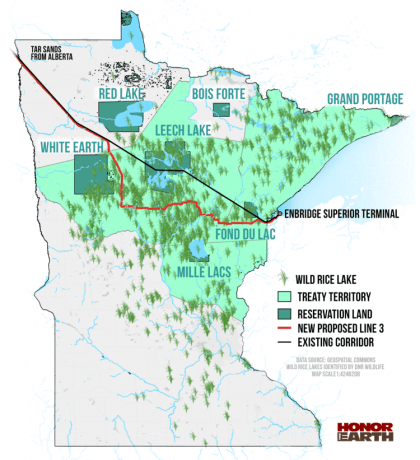Standing with the Anishinaabe

Tar Sands Healing Walk, 2013
Northern Minnesota—its Anishinaabe peoples, its farmers, and its small towns—is under siege. The Canadian fossil fuel company Enbridge has worked since 2013 to push a new pipeline through its woods, lakes, and rivers. Called “Line 3,” the pipeline is designed to transport crude oil from the tar sands of Alberta to the shores of Lake Superior. Despite years of resistance in the form of testimony, court cases, encampments and the laying down of bodies before machinery, in December 2020 Enbridge finally got the go-ahead to start ripping out forests in the proposed pipeline’s path.

Enbridge Line 3 impact on treaty resources. Learn more at stopline3.org. Map: Unicorn Riot
Enbridge claims that this pipeline is merely a replacement for an existing Line 3 that is so old and corroded that it can bear only half of its original capacity for oil. But this new Line 3 follows an entirely new route and will be twice the size of the old line. It is an entirely different pipeline meant to accelerate the transportation of tar sands crude oil for the world’s use.
Crude oil produced from the Alberta tar sands is a nightmare. Minnesota’s own Environmental Impact Statement for the Line 3 project found that the greenhouse gas emissions attributable to this pipeline could reach the equivalent of 50 coal-fired plants in each year of its operation. This is more than the annual GHG emissions for the entire state of Minnesota. Moreover, if spilled this sludge-like crude is nearly impossible to clean up. 350Kishwaukee has compiled data on Enbridge spills and found at least 1,000 between 1996 and 2014. As the author Louse Erdrich, a member of the Turtle Band of Chippewa, has written, Line 3 is “not just another pipeline. It is a tar sands bomb.”
The Anishinaabe peoples in northern Minnesota have led the fight against Line 3 for years. Permits to lay Line 3 along this route directly violate long-standing treaties. These treaties both established formal reservations and acknowledged Anishinaabe rights to hunt, fish, harvest wild food and follow other traditional practices throughout the region. As water protectors and land protectors, the Red Lake Band of Chippewa and the White Earth Band of Ojibwe have sued in court to try to stop Enbridge, thousands of people—Native American and non-Native—testified and submitted comments, and tribal elders have been arrested for acts of nonviolent resistance. But to no avail.
Enbridge’s Line 3 raced through construction and started pumping tar sands crude in October 2021. It shelled out millions of dollars to various Minnesota agencies to police the construction. Hundreds of water protectors were arrested and now face criminal charges. You can sign this petition to drop the charges. Meanwhile, water protectors are testing rivers and streams to keep track of the impact of Line 3. And they’ve geared up for other fights. “Much in the same way that all the oil companies learn from every fight, from Keystone to Standing Rock to Line 3… we’re also doing that as well,” says Joshua Peston, an attorney who represented Line 3 protestors. “Maybe we didn’t win this one, but we’re going to be better situated to win the next one.”
Sources
- Latest news on the fight to stop Line 3
- Fight going on since 2013: timeline
- For go ahead: court case in December 2020: Gene Laverty, “Minn. (sic) regulator denies tribes’ bid to halt Enbridge Line 3 construction,” SNL Energy FERC Gas Report (Charlottesville), 09 Dec. 2020; court case in February, 2021: Mike Hughlett, “Court won’t halt work on Line 3 pipeline; Two Ojibwe bands had asked for a stay on the controversial Enbridge replacement project” Star Tribune (Minneapolis), 03 Feb. 2021. Both found via Proquest database.
- For old Line 3’s half capacity: Hughlett article above.
- For new Line 3 as entirely new: source; video: “What is Line 3?”
- Minnesota’s EIS and 350Kishwaukee data: Louise Erdich, “Not just another pipeline: The permits were a breathtaking betrayal,” Star Tribune (Minneapolis), 03 Jan 2021 (originally an op ed piece in the NY Times, 28 Dec. 2020). Proquest database.
- Treaty violations: Nick Engelfried, “Indigenous-led resistance to Enbridge’s Line 3 pipeline threatens Big Oil’s last stand.” WageNonViolence, posted 14 December, 2020
- For Red Lake Band and White Earth Band suits, see court cases in the second set of sources.
- For testimony, comments: Engelfried article above
- For nonviolent action: Engelfried article above; Houska article below
- For quote: Tara Houska, “#DefundLine3: Because Stopping This Pipeline is a Matter of Justice” on Common Dreams, posted 9 February, 2021
- Great map of Line 3 from Unicorn Riot
